Kyle Rittenhouse, deadly shooter, college speaker? A campus gun-rights tour sparks outrage
Kyle Rittenhouse is not a typical college campus speaker.
In 2020, at the age of 17, he took an AR-15-style rifle to a Black Lives Matter demonstration and fired it, killing two people and injuring a third. Rittenhouse said he pulled the trigger in self-defense and was acquitted of wrongdoing.
He has since penned a book, “Acquitted,” and has set out on a series of college speaking events dubbed the "Rittenhouse Recap." He is slated to appear Thursday at Clemson University in South Carolina.
Rittenhouse is selling books, and ostensibly promoting the right to bear arms on campus, but he’s also trying to persuade young people to join the conservative movement. The key group behind the appearances, Turning Point USA, is led by the self-described “youth director” of President Donald Trump’s first campaign and a key ally rallying votes for Trump this year.
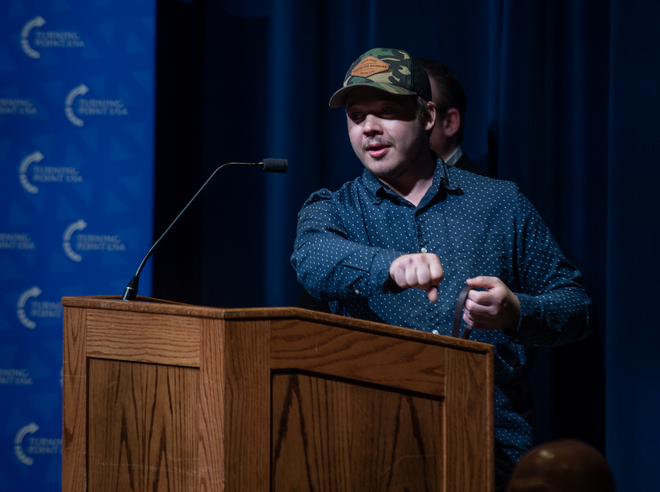
The group told USA TODAY that it isn’t a nationally organized tour – that its chapters independently requested Rittenhouse. Student chapter leaders told USA TODAY that Rittenhouse is an important conversation starter. “I think sometimes you have to be kind of polarizing to pull a crowd," said Brady Seymour, president of Turning Point USA's chapter at Kent State University in Ohio.
The provocative choice of backing the Rittenhouse tour is par for the course for Turning Point and its local affiliates, which have hosted controversial figures like Nick Fuentes, a white nationalist and Holocaust denier. But it has stirred up devastating pain and disdain in a man he almost killed.
"He has used every moment to gloat and to make light of taking life," Paul Prediger said, speaking publicly for the first time about what happened in protest of a Rittenhouse speech last week at Kent State. "As if that were not enough, Kyle has embraced and been embraced by those who peddle hateful rhetoric, who believe in nationalism that excludes those who do not look like or think like them, and who have sought to amplify a troubling desire for violence against supposed political, cultural, and religious enemies."
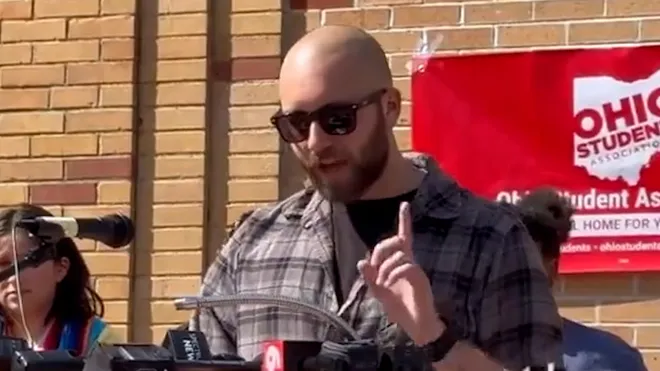
Rittenhouse's message on his campus tour – that students should be allowed to take up arms, citing fears of terrorists invading dormitories – has sparked protests and raised questions about free speech and just how far it should be allowed to go. A similar question helped lead to the resignations of the presidents of the University of Pennsylvania and Harvard University, who stepped down amid fierce criticism for equivocating when asked if calls for the genocide of Jews would be allowed on campus.
Rittenhouse, in a statement provided by spokesperson Jillian Anderson, said his campus appearances are not part of an official tour or book-selling venture, and he is reminding students of their rights. "Every American has a constitutional right to bear arms," he said, "and it should not be infringed by a college campus."
Experts say context matters. Tom Ginsburg, a law professor at the University of Chicago and faculty director of the forum on free inquiry and expression, told USA TODAY that federal regulations require colleges and universities to ensure their learning environment is not hostile. Within that framework, some incendiary language could be permitted in a general public space but prohibited if directed at an individual or group.
"That's a key distinction," he said. "Is it said in general, as part of a general demonstration, or is it shouted at a particular group of people who might then reasonably perceive it as being a threat of some kind? And if it's the latter, then it could be punished."
Kyle Rittenhouse says students should carry guns on campus
On the evening of August 25, 2020, Rittenhouse brought a rifle to the site of intense protests in Kenosha, Wisconsin, sparked by the police shooting of Jacob Blake, a 29-year-old Black man. Amid a scuffle with protesters, Rittenhouse fatally shot Joseph Rosenbaum and Anthony Huber and wounded Prediger.
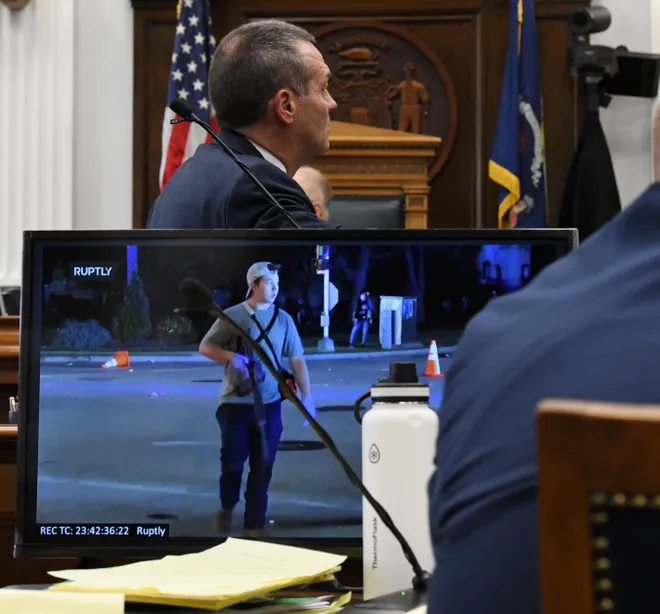
In a trial that drew national attention in 2021, Rittenhouse said he shot the men in self defense after Rosenbaum threatened his life and Prediger pointed a gun at him. Prediger said he thought Rittenhouse was an active shooter. Critics said Rittenhouse had no right to fire his weapon and was illegally acting as a vigilante militia. A jury acquitted him of all five charges he faced, including intentional homicide.
Rittenhouse soon took on celebrity status in right-wing circles where the right to bear arms and use them to defend life and property is sacrosanct. The weekend after his trial, he flew to Florida to visit Trump at his Mar-a-Lago resort and to appear on Fox News for an interview with conservative host Tucker Carlson.
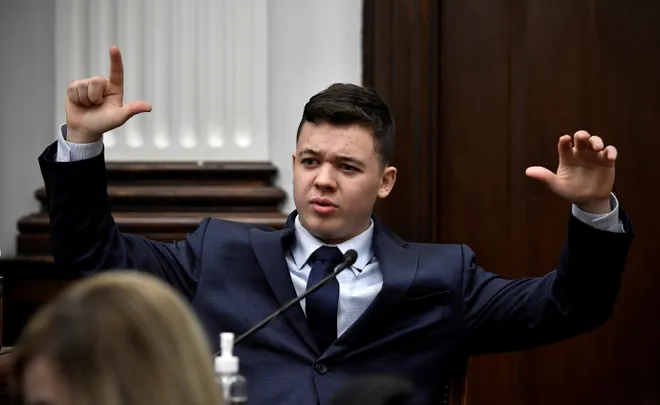
At Kent State, Rittenhouse implored students to fight to be allowed to carry guns at school.
"We have these blue boxes that are on the campus – we've all seen them, you push a button, it calls the police, and you get connected to a dispatcher," he said. "How long does it take a cop to show up, though? When somebody is trying to kidnap you or somebody is threatening your life, is that the quickest option to be able to protect yourself?"
He encouraged students to join conservative groups like Turning Point USA and said elected officials don't care about them.
"What makes me really scared, and I get really upset that people, especially young campus students, aren't allowed to carry firearms, just because I'm scared that what happens if these Hamas, Palestinian terrorists come to the U.S. and try to attack us?" Rittenhouse said. "Are we supposed to be left defenseless? Are you supposed to be left defenseless because you're not allowed to have a gun in your dormitory?"
After Prediger – formerly known as Gaige Grosskreutz – criticized his speaking tour, Rittenhouse posted a video clip on X. It showed Prediger admitting he pointed a gun in Rittenhouse's direction before being shot. Rittenhouse did not include text in the post.
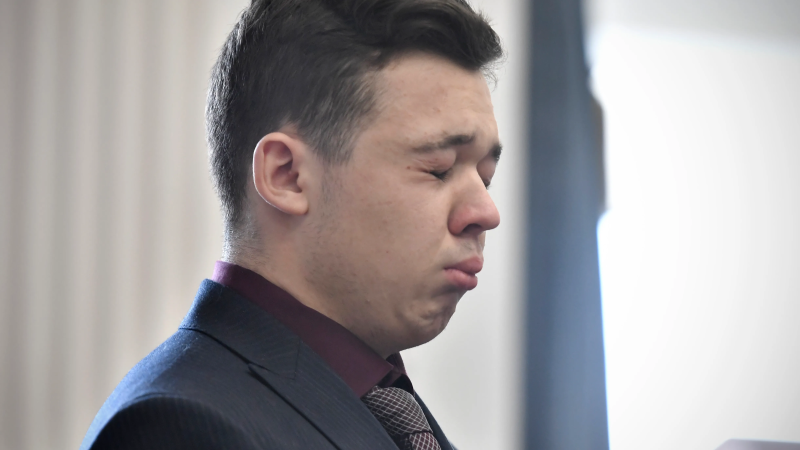
Students accuse Turning Point of 'hateful actions'
In the days leading up to his arrival at Kent State, demonstrators staged a walkout, organized a vigil, and spray painted "Welcome, killer" on a free-speech landmark. A Change.org petition urging the university and Turning Point USA to cancel Rittenhouse's visit gathered more than 3,700 signatures. The event spurred Prediger to speak out. Hundreds showed up to protest.
"I stand with the students of Kent State University who have had enough," Prediger said.
Students said it was particularly insensitive for the campus to host Rittenhouse and his message of guns on campus given the school's history. On May 4, 1970, four students were gunned down at Kent State when the Ohio National Guard fired into a crowd gathered to protest the invasion of Cambodia during the Vietnam War.
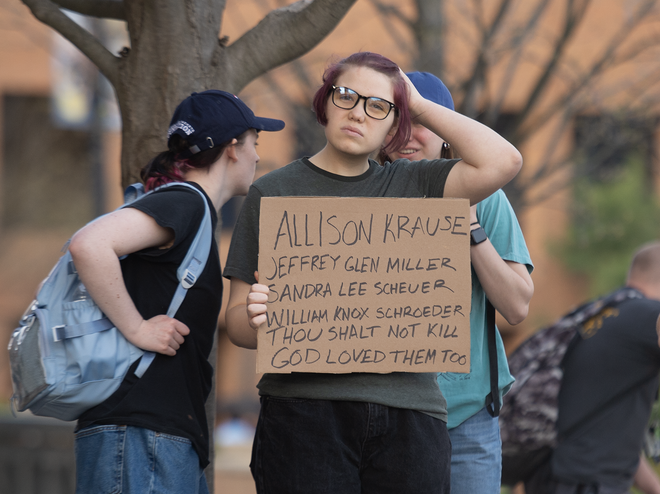
Aimée Flores, a representative from the university's Spanish and Latine Student Association, said the organization encouraged students "to learn more about Turning Point USA.... their hateful actions on campus and throughout this whole year, why we don't agree with their actions."
Seymour, the school's Turning Point chapter president, said the event was about "creating conversation." It had no relation to the 1970 killing of protestors, he said.
"In his speech, he talked mostly about having the right to carry on campus, considering students aren't allowed to at Kent State," Seymour said.
"These two stories are completely different and 50 years apart," he said.
Protests at every campus on 'Rittenhouse Recap' tour
Other “Rittenhouse Recap” appearances prompted vocal opposition and protest.
At Western Kentucky University, protesters held a sit-in and march last month. His appearance at East Tennessee State University in February also sparked demonstrations – local press reports show one protester wielding a sign accusing Turning Point of empowering "stochastic terrorism" – the incitement of violence through public demonization of a person or group.
In the days leading up to Rittenhouse's appearance at The University of Memphis in March, the school fielded a barrage of complaints from students, faculty, and community members. Protesters held signs with messages like, “Put Rittenhouse behind bars not a podium.” Rittenhouse abruptly left the stage after about 30 minutes as protesters shouted him down.
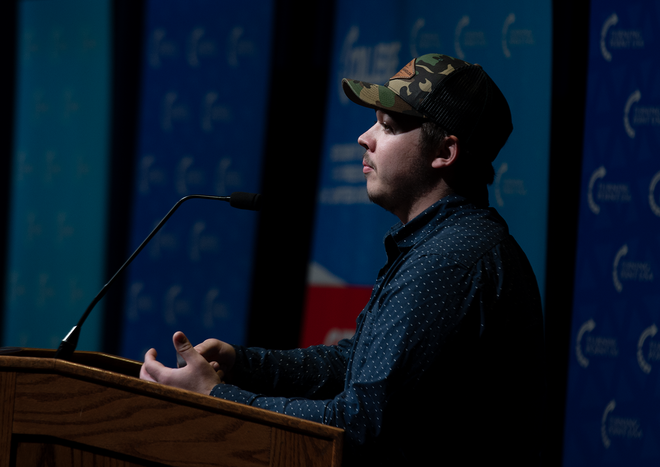
Universities said allowing the events – and the protests – upholds key tenets of American democracy and academic tradition: Free speech and freedom of assembly. Turning Point USA’s chapter at The University of Memphis is a registered student organization, the school said.
"We cannot ban speech because it would go against a core value and because of well-established laws governing free speech on public university campuses,” Kent State said in a statement provided to USA TODAY. “Upholding the First Amendment rights of free speech and peaceful assembly for all, the university has a long history of allowing peaceful dialogue from all points of view, including those whom some may feel are offering different and/or sometimes controversial opinions."
Turning Point has history of booking controversial speakers
Turning Point USA has a track record of booking controversial and provocative figures, placing it at the center of debates over First Amendment rights on college campuses, where it says it has grown to more than 800 chapters since its founding in 2012.
In late 2016 and early 2017, the group was behind a nationwide campus speaking tour by Milo Yiannopoulos – a former Breitbart writer banned from Twitter for harassment and dropped from the agenda at a Conservative Political Action Conference after videos surfaced of him defending sexual relationships between 13-year-old boys and grown men. Yiannopoulos said he was joking and may have used "imprecise language."
In 2019, Turning Point’s Iowa State University chapter claimed partial responsibility for extending a speaking invitation to Nick Fuentes, a white nationalist who has said he wants a "total Aryan victory" and self-identified as a "sexist man," according to the Southern Poverty Law Center.
Last year, representatives of the group confronted, criticized and assaulted an LGBTQ+ instructor at Arizona State University in Tempe.
Turning Point has taken action against members for promoting hate speech. In 2019, the group expelled a member at the University of Nevada Las Vegas after video surfaced of the student shouting "white power" and using a white supremacist hand sign.
Andrew Kolvet, a spokesperson for Turning Point USA, said students should be able to hear from controversial speakers. "We do our best to make sure that there's going to be enriching discussion, that the speaker is going to be, I would say, uplifting, inspiring, productive."
He said Turning Point chapters chose Rittenhouse as a speaker. "There just happened to be schools that asked for Kyle because he came out with a book and he made himself available, essentially."
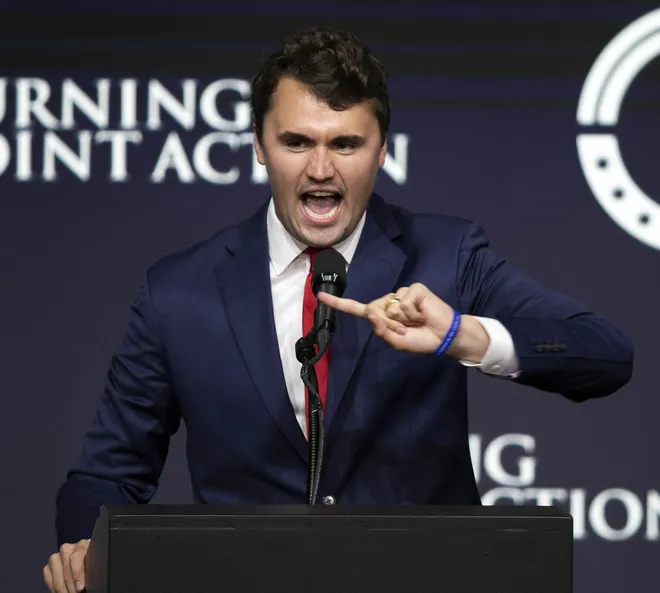
Turning Point touts itself as a key player in conservative politics, as does its founder and president, Charlie Kirk, who told conservative radio host Rush Limbaugh's show in 2019 that he “traveled the country for about 70 days straight carrying Donald Trump Jr.’s bags and getting his Diet Cokes.” In addition to becoming Trump Jr.'s "body man," he took on the role of "youth director of the campaign," Kirk said. Speaking at the Republican National Convention in 2020, he called President Trump the "bodyguard of western civilization."
Kirk also speaks on college campuses, where his fiery rhetoric has sparked controversy. At a speech last fall at Missouri State University, he said all immigration to the U.S. should be halted, called global warming an "academic distraction," and speculated about how many Hamas sleeper cells might be active in the U.S.
Expert says universities grappling with non-academic provocateurs
Ginsburg stressed that colleges and universities must allow free speech. "It’s pretty clear that their obligation is to make sure that event goes forward and to make sure it's not disrupted," he said. "At the same time, peaceful protest also has a long tradition on campus."
Ginsburg said an added dimension to their challenges is the more recent phenomenon of campus speakers who intentionally draw negative attention.
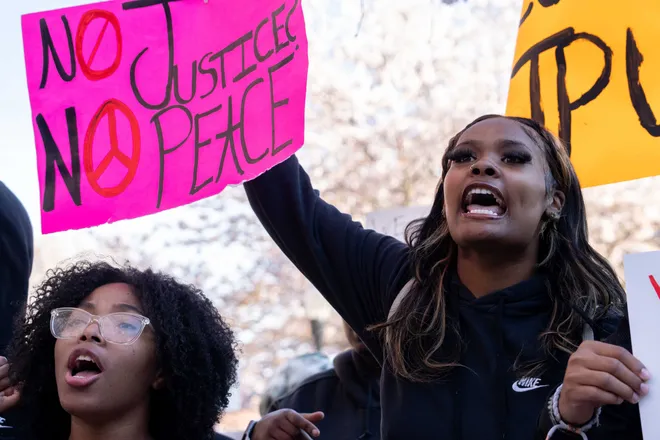
"What we're now seeing is that people are sometimes getting invited to campus who aren't necessarily academics. They're not articulating a truly academic point of view," Ginsburg said. "In some cases, we have provocateurs, including some people who actually are seeking to be canceled, seeking to be protested."
He said people like Rittenhouse often capitalize on controversy. "He's certainly part of a media ecosystem in which you do have some of those kind of characters where, if you can get canceled, it ups your follower rate and you can portray yourself as a victim," he said.
To the Turning Point leader at Kent State, it's a tactic the group uses to advance conversation.
"That's the sad reality of how people are," Seymour said. "You kind of have to stir up drama or be a polarizing character for people to end up paying attention to you."
Cybele Mayes-Osterman is a breaking news reporter for USA Today. Reach her on email at cmayesosterman@usatoday.com. Follow her on X @CybeleMO.
Disclaimer: The copyright of this article belongs to the original author. Reposting this article is solely for the purpose of information dissemination and does not constitute any investment advice. If there is any infringement, please contact us immediately. We will make corrections or deletions as necessary. Thank you.






